Bitcoin Exchanges Demystified: How to Buy, Sell, and Trade Bitcoin
Introduction
In the vast realm of digital finance, Bitcoin stands as a beacon, signaling the dawn of a new age. Often dubbed as ‘digital gold’, Bitcoin has not only introduced the world to the concept of decentralized digital currency but has also paved the way for a plethora of other cryptocurrencies. Central to the operations of buying, selling, and trading Bitcoin are platforms known as Bitcoin exchanges. These platforms, much like their traditional counterparts, serve as marketplaces for trading assets. However, instead of stocks or commodities, they deal with digital currencies. This article aims to demystify these platforms, offering a step-by-step guide into their intricacies.

The Genesis of Bitcoin
Before diving into the world of Bitcoin exchanges, it’s essential to understand the genesis of Bitcoin itself. In 2008, an individual or group under the pseudonym ‘Satoshi Nakamoto’ introduced Bitcoin as a response to the financial crisis. It was presented as a decentralized currency, free from government intervention and financial institutions.
Why Bitcoin Exchanges?
Just as gold needs a marketplace where it can be traded for cash or commodities, Bitcoin requires a platform where it can be exchanged for other currencies, be it digital or fiat. This is where Bitcoin exchanges come into play. They offer a platform where traders can exchange their Bitcoins for fiat currencies like USD, EUR, or other cryptocurrencies like Ethereum, Ripple, etc.
Bitcoin’s Journey and the Role of Exchanges
From its inception in 2009 to its peak in late 2017 and beyond, Bitcoin’s value has seen dramatic fluctuations. These price dynamics are largely influenced by the operations on Bitcoin exchanges. Factors such as trading volume, liquidity, and external events (like regulatory news or security breaches) play a significant role in determining Bitcoin’s price on these platforms.
Comparison with Traditional Exchanges
| Criteria | Traditional Exchanges | Bitcoin Exchanges |
|---|---|---|
| Nature of Assets | Stocks, Commodities, Bonds | Cryptocurrencies |
| Regulation | Heavily regulated by financial authorities | Varies by country; some heavily regulated, others not |
| Centralization | Typically centralized | Can be centralized or decentralized |
| Trading Hours | Set trading hours (e.g., 9 AM – 4 PM) | Typically 24/7 |
In essence, while Bitcoin exchanges draw parallels with traditional exchanges in their function as trading platforms, they are inherently different in terms of assets they deal with, their regulatory landscape, and their operational dynamics.
What is a Bitcoin Exchange?
A Bitcoin exchange, at its core, is a digital marketplace designed to facilitate the buying, selling, and trading of cryptocurrencies, primarily Bitcoin. Much like stock exchanges where shares of companies are traded, Bitcoin exchanges allow for the trading of digital currencies. However, the nuances and intricacies of these platforms differ significantly from traditional exchanges.
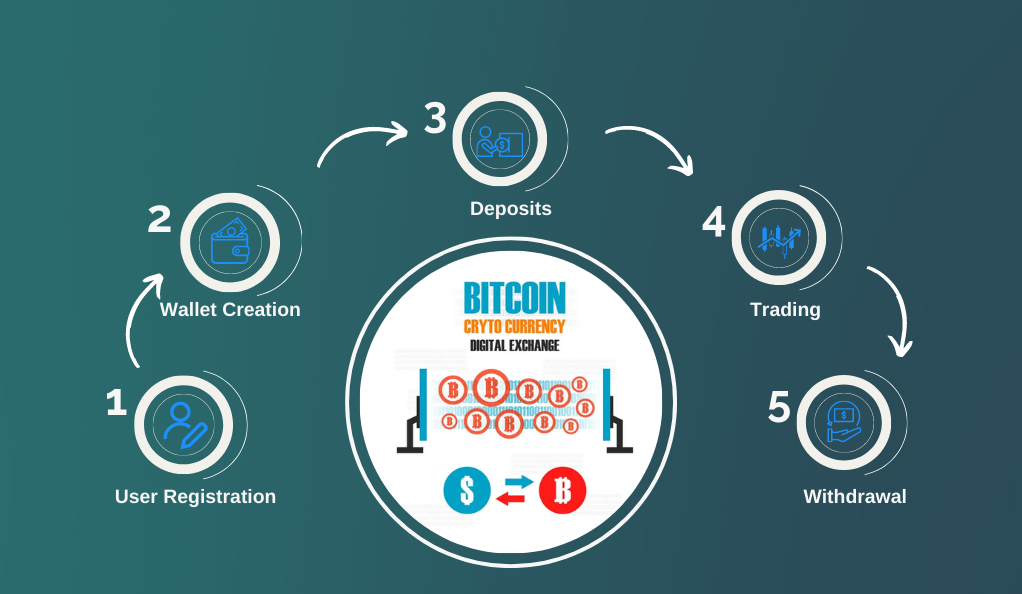
The Mechanics of a Bitcoin Exchange
At a high level, here’s how a Bitcoin exchange operates:
- User Registration: A potential trader first registers on the platform, providing necessary details. This often includes email verification and may extend to more stringent Know Your Customer (KYC) procedures, depending on the exchange’s regulatory environment.
- Wallet Creation: Upon successful registration, the user is provided with a digital wallet. This wallet, secured by cryptographic keys, is where the user’s Bitcoin or other cryptocurrencies will be stored.
- Deposits: Before trading can commence, the user needs to deposit funds. This can be in the form of fiat money or other cryptocurrencies.
- Trading: Once funds are deposited, the user can place orders to buy or sell Bitcoin. These orders are matched with opposite orders (sell orders for buy requests and vice versa).
- Withdrawal: Post-trading, users can withdraw their Bitcoin or fiat currency back to their personal wallets or bank accounts, respectively.
Centralized vs. Decentralized Exchanges
While the basic mechanics remain consistent, Bitcoin exchanges can be broadly categorized into two types based on their operational model:
- Centralized Exchanges (CEX): These are managed and operated by centralized organizations. They act as intermediaries, holding users’ funds and facilitating trades. Examples include Binance, Coinbase, and Kraken. While they offer high liquidity and user-friendly interfaces, they are also susceptible to security breaches.
- Decentralized Exchanges (DEX): These platforms operate without a central governing body. All trades are executed directly between users, facilitated by smart contracts. Examples include Uniswap and Sushiswap. They offer enhanced security and privacy but might lack in user-friendliness and liquidity.
The Fee Structure
Almost all Bitcoin exchanges operate on a fee model. These fees can be categorized as:
- Trading Fees: Charged on every trade, usually as a percentage of the trade’s value.
- Deposit/Withdrawal Fees: Charges incurred while depositing or withdrawing funds from the exchange.
- Listing Fees: For newer exchanges, a fee might be charged to list a new cryptocurrency.
It’s crucial for traders to be aware of these fees, as they can significantly impact the profitability of their trades.
Types of Bitcoin Exchanges
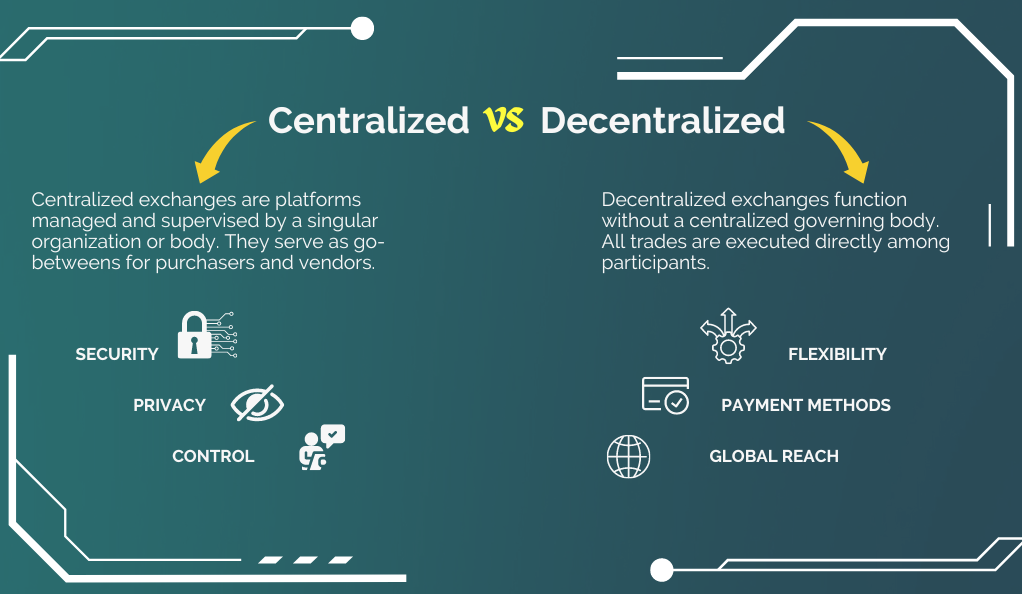
The cryptocurrency landscape is vast, and as such, there are various types of Bitcoin exchanges catering to different needs and preferences of traders. Understanding these types is crucial for anyone looking to navigate the world of digital currency trading effectively.
Centralized Exchanges (CEX)
Definition: Centralized exchanges are platforms operated and overseen by a single organization or entity. They act as intermediaries between buyers and sellers.
Features:
- High Liquidity: Due to a large number of users, these exchanges often have high trading volumes, ensuring smooth trading experiences.
- User-Friendly Interfaces: Most CEXs offer intuitive interfaces, making them suitable for beginners.
- Customer Support: Being organization-driven, they usually provide customer support for users facing issues.
Decentralized Exchanges (DEX)
Definition: Decentralized exchanges operate without a central authority. All transactions occur directly between users.
Features:
- Security: Without a central point of failure, DEXs are less vulnerable to large-scale hacks.
- Privacy: Transactions are often more private, with less stringent KYC procedures.
- Control: Users have full control over their funds, reducing the risk of loss due to exchange insolvency.
Peer-to-Peer (P2P) Platforms
Definition: P2P platforms connect individual buyers and sellers directly, without an intermediary.
Features:
- Flexibility: Users can set their prices and choose whom to trade with.
- Payment Methods: Often support a wide range of payment methods, from bank transfers to gift cards.
- Global Reach: P2P platforms often cater to a global audience, including regions with fewer banking facilities.
Comparison Table
| Exchange Type | Liquidity | Security | User Experience | Control Over Funds |
|---|---|---|---|---|
| CEX | High | Moderate | Excellent | Limited |
| DEX | Moderate | High | Varies | Full |
| P2P | Varies | Varies | Good | Full |
How to Choose the Right Bitcoin Exchange
Selecting the right Bitcoin exchange is a pivotal decision that can influence a trader’s experience and profitability. Here are some factors to consider:
- Security Protocols: Ensure the exchange employs robust security measures like two-factor authentication (2FA), cold storage, and encryption protocols.
- Reputation: Research the exchange’s reputation within the crypto community. Platforms with a history of hacks or poor customer service should be approached with caution.
- Fees: Examine the fee structure. While some exchanges might offer lower trading fees, they might compensate with higher withdrawal or deposit fees.
- User Experience: An intuitive interface can significantly enhance the trading experience, especially for newcomers.
- Supported Cryptocurrencies: If you’re looking to trade altcoins, ensure the exchange supports a wide variety of cryptocurrencies.
- Geographical Restrictions: Some exchanges might not operate in certain countries or regions. Ensure the platform is accessible from your location.
- Customer Support: Efficient customer support can be invaluable, especially when facing issues related to funds or trades.
By understanding the different types of Bitcoin exchanges and the factors to consider when choosing one, traders can optimize their trading journey, ensuring safety, efficiency, and profitability. The next sections will further delve into the practical steps of trading and the potential risks and future outlook of Bitcoin exchanges.
Steps to Buy and Sell Bitcoin on an Exchange
Navigating the world of Bitcoin exchanges can seem daunting, especially for those new to the cryptocurrency space. However, with a systematic approach, the process becomes straightforward. Here’s a step-by-step guide to buying and selling Bitcoin on an exchange:
1. Creating an Account:

- Registration: Begin by signing up on your chosen exchange platform. This usually involves providing an email address and setting a password.
- Verification: Most exchanges require users to verify their email addresses. Some might also necessitate additional KYC (Know Your Customer) procedures, where users must provide personal information and documents to comply with regulatory standards.
2. Depositing Funds:
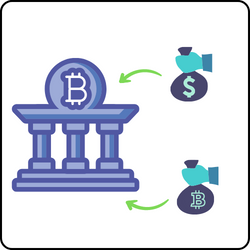
- Fiat Currency: Many exchanges allow users to deposit fiat money using various methods, such as bank transfers, credit/debit cards, or even PayPal. Ensure you’re aware of any deposit fees.
- Cryptocurrency: If you already own Bitcoin or another cryptocurrency, you can deposit it into the exchange’s wallet. Always double-check the deposit address to avoid any mistakes.
3. Placing Buy/Sell Orders:
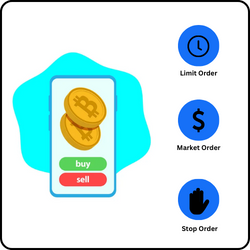
- Market Order: This allows you to buy or sell Bitcoin at the current market price. It’s the quickest method but might not always fetch the best price.
- Limit Order: Here, you set a specific price at which you wish to buy or sell. The order will only execute when the market reaches your set price.
- Stop Order: This order becomes active only after a certain price level is reached. It’s useful for mitigating potential losses during volatile market conditions.
4. Securing Your Investment:
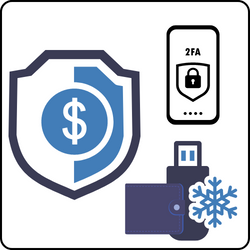
- Two-Factor Authentication (2FA): Always activate 2FA for added security. This requires a second verification step, usually through a mobile app or SMS, before accessing your account or making transactions.
- Cold Storage: If you’re holding a significant amount of Bitcoin, consider transferring it to a cold wallet—a wallet not connected to the internet. This minimizes the risk of online hacks.
5. Withdrawing Bitcoin or Fiat Currency:
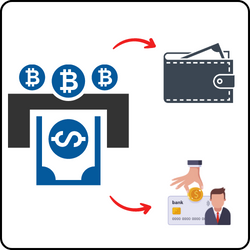
- To Personal Wallet: When withdrawing Bitcoin, it’s crucial to double-check and confirm that you’re transferring it to the accurate address of your private wallet to avoid potential losses.
- To Bank Account: When making fiat currency withdrawals, it’s essential to meticulously verify that your bank information is accurately inputted. Additionally, always stay informed about any associated withdrawal restrictions and potential transaction charges.
Risks and Challenges of Using Bitcoin Exchanges
While Bitcoin exchanges offer a convenient platform for trading, they’re not without risks:
- Security Concerns: Exchanges, especially centralized ones, are prime targets for hackers. Notable breaches, like the Mt. Gox incident, have resulted in users losing millions.
- Regulatory Changes: The cryptocurrency landscape is still evolving, and sudden regulatory changes can impact an exchange’s operations or even lead to its shutdown.
- Liquidity Issues: Smaller exchanges or those facing regulatory scrutiny might suffer from liquidity issues, making it challenging to execute large trades.
- Technical Glitches: As with any online platform, exchanges can face technical issues, leading to trading halts or loss of funds.
The Future of Bitcoin Exchanges
The cryptocurrency space is dynamic, and exchanges are at its forefront. As technology advances:
- Enhanced Security: Exchanges will likely adopt more robust security protocols, incorporating AI and advanced encryption methods.
- Regulatory Clarity: As governments worldwide understand cryptocurrencies better, clearer regulations might emerge, providing a more stable environment for exchanges.
- Mainstream Adoption: With more institutional investors entering the crypto space, exchanges will play a pivotal role in bridging the traditional and digital finance worlds.
Conclusion
In the rapidly evolving landscape of digital finance, Bitcoin exchanges stand as pivotal gateways, bridging the traditional financial world with the revolutionary realm of cryptocurrencies. As we’ve journeyed through this article, the importance of understanding the intricacies of these platforms becomes abundantly clear. Just as a stock trader must comprehend the nuances of stock exchanges, a cryptocurrency trader’s success hinges on their grasp of Bitcoin exchanges. These platforms not only determine the value of Bitcoin through supply and demand dynamics but also influence its broader adoption, regulatory perceptions, and overall market sentiment.
However, with great opportunity comes inherent risk. The world of Bitcoin exchanges, while offering immense potential for growth and innovation, is also fraught with challenges. From security breaches to regulatory uncertainties, traders must tread with caution. But it’s not a journey they embark upon blindly. Armed with knowledge, research, and a keen understanding of the market, traders can navigate these challenges, turning potential pitfalls into opportunities for growth. It’s this informed approach, coupled with the right tools and platforms, that paves the way for success in the crypto trading arena.
In closing, as we stand on the cusp of a financial revolution, Bitcoin exchanges are more than just platforms; they’re the epicenters of change. By delving deep into their workings, traders not only equip themselves for a prosperous trading journey but also contribute to the broader narrative of cryptocurrency adoption. So, whether you’re a seasoned trader or a curious newcomer, approach the world of Bitcoin exchanges with curiosity, caution, and confidence. Your informed journey today will shape the financial stories of tomorrow.
Bitcoin-up is dedicated to providing fair and trustworthy information on topics such as cryptocurrency, finance, trading, and stocks. It's important to note that we do not have the capacity to provide financial advice, and we strongly encourage users to engage in their own thorough research.
Read More